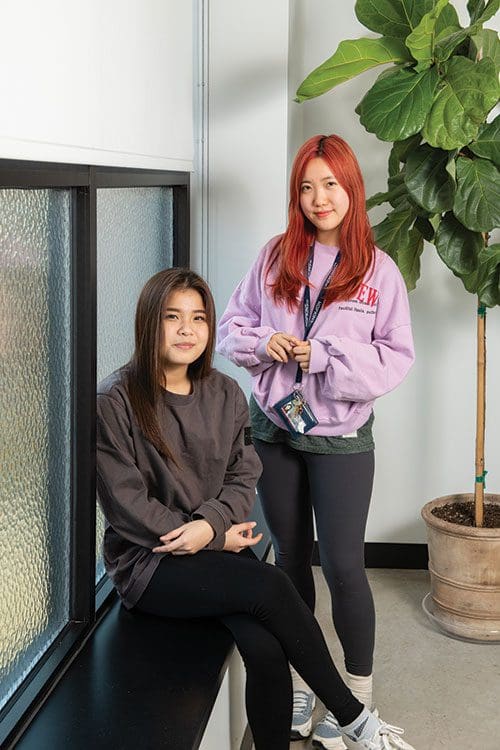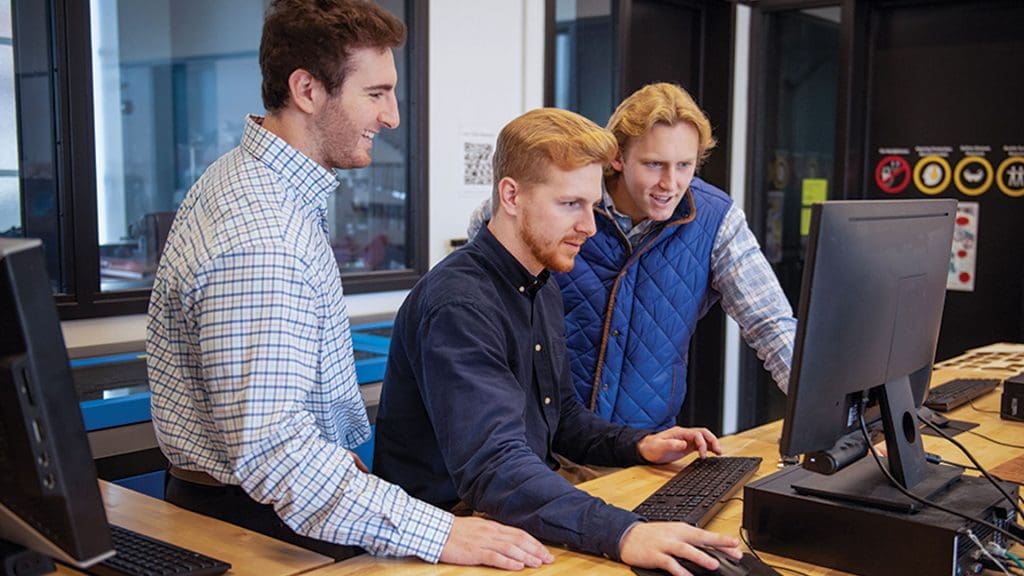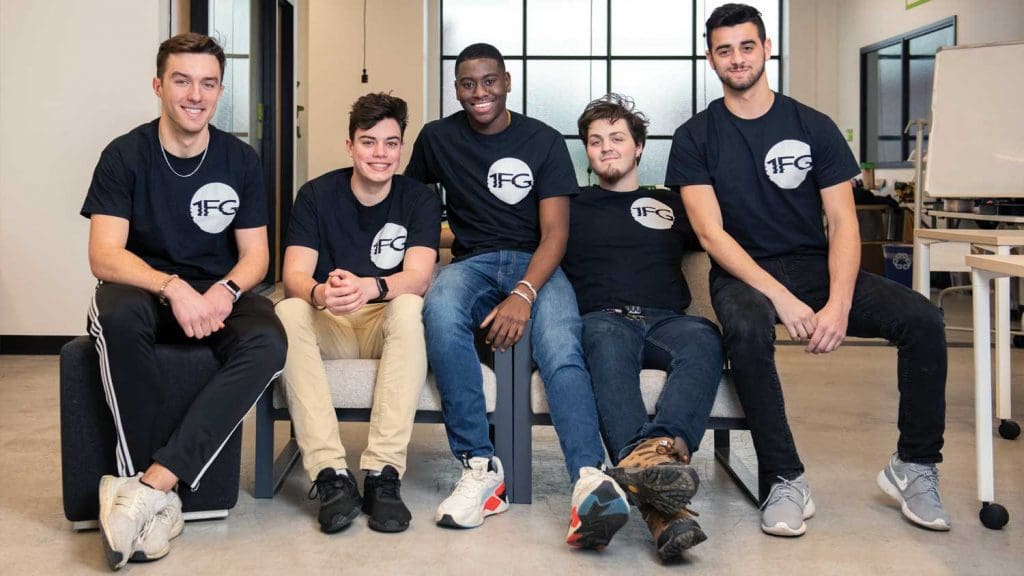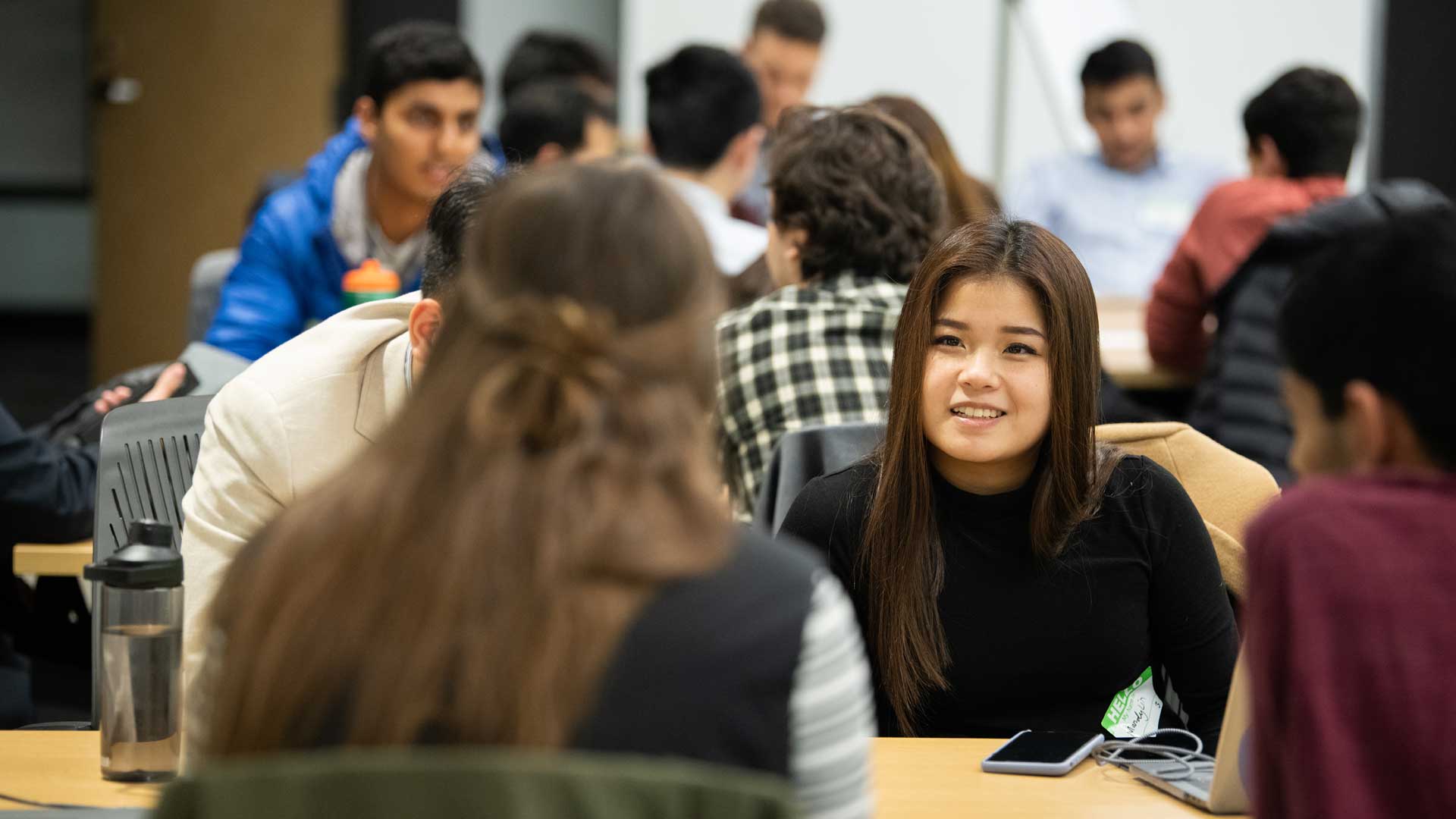
Mandy Lin and Kyuhee Jo may only be first-year students, but they already have big entrepreneurial ambitions. The pair has been brainstorming startup ideas since their Introduction to Business course last semester, and they finally landed on the perfect concept in February.
“We gave out a questionnaire to freshmen and found that 50 percent of students are spending their spare time on YouTube or Netflix,” says Jo, who is double majoring in computer science and economics. When asked if they would rather be doing something else, most people said they wanted to be more productive, engaging in hobbies or professional development. “We thought there was a mismatch between what they want and what they’re doing, and we wanted to change that.”
Lin and Jo’s solution is SpareTime, a mobile app that recommends events, activities, and learning opportunities based on users’ preferences and availability in their electronic calendars. These time-targeted ads allow students to seamlessly make bookings through their Apple or Google calendars, while also providing a platform for people to promote their events and professional development services.
SpareTime is one of 19 startups that were selected into FastForward U’s spring Accelerator program, which helps students from across Johns Hopkins bring their business ideas to life.
Located in a former factory building in Remington, near the Homewood campus, FastForward U features 10,000 square feet of space, including a 2,000-square-foot makerspace with high-tech tools for crafting, building, and engineering. The facility opened its doors to all students in 2018, but those accepted into the Accelerator program have the added benefit of one-on-one mentoring, educational sessions, and the opportunity to work alongside other student entrepreneurs.
“We got this opportunity and now we’re really hyped,” says Lin, who is double majoring in economics and international studies.
Hopkins is a top research institution, which means we should have a lot more entrepreneurship going on. It’s nice that FastForward U has come along to help kids do that.”
—Mandy Lin
The Accelerator has two tracks: “Spark” is for early-stage companies looking to validate their idea, while “Fuel” is for teams seeking to grow and scale their ventures. In addition to a written application, prospective students are required to pitch their business idea before a panel of local entrepreneurs and FastForward U staff. Teams that make the cut must show up twice a week for mentoring sessions and presentations by local entrepreneurs.
“Our job is really to help people learn entrepreneurial skills,” says Kerrie Carden, director of student ventures for FastForward U. “Given the way startups work, these ventures may not make it all the way to market, but the skills students are learning are invaluable.”
The nine-week program, which welcomed its first cohort in the fall of 2019, culminates with a Demo Day where students pitch their polished business ideas. The Spark team with the winning pitch receives $1,000 and automatic placement into the Fuel accelerator for the following semester, while the winning Fuel team receives $10,000. Win or lose, every team that successfully participates is guaranteed at least $1,000 in startup funding.
Lin and Jo, who were accepted into the Spark Accelerator, want to dedicate their time at FastForward U to fine-tuning their app and finding a web developer to join the team. They’re also looking forward to receiving technical guidance from their mentors. If all goes well, Lin dreams of going to Silicon Valley to pitch SpareTime to venture capitalists.
“Students here are not only passionate, they’re really oriented toward having an impact,” says Carden. “It’s not just about creating a profitable business, but about impacting people and the world positively.”
Graff Golf

One student startup that has thrived with help from FastForward U is Graff Golf. Founded by three Hopkins football players, the company has designed a golf ball with an internal circuit board that collects data to help players improve their technique.
Graff Golf, named to honor JHU’s late football coach, Jim Margraff, is planning to ship orders to its first customers this summer. But just 18 months ago, the team of undergrads barely knew where to begin.
“The hardest thing about launching a startup without any experience is just knowing what the first step is,” says founder Aaron Shapiro, a sophomore economics major.
He first thought of the idea to use technology to improve his golf game in seventh grade, when he discovered he was “terrible” at the sport. The concept stuck with him, and shortly after arriving at Hopkins, he began looking for ways to make his childhood dream a reality. Engineering and computer programming weren’t his strong suits, so he asked two upperclassmen on the football team to go into business with him.

[Photo: Lacey Ann Johnson]
“It was definitely really daunting early on,” says Mike Eberle, a senior majoring in computer science and the last co-founder to join the company. “And we’re all pretty bad at golf.”
In the spring of 2019, they turned to FastForward U for guidance. The Accelerator program had yet to launch, but they were able to apply for a small Spark grant. From there, student program manager Kevin Carter took the team under his wing.
“We came in with literally just an idea and some words on some slides,” says Shapiro. “I don’t think we would have been able to start, or get the ball moving in any aspect, without Kevin and FastForward U being there.”
Carter helped the team refine their pitch and connected them with local alumni, some of whom decided to invest in the company. He also encouraged them to apply for the 2019 JHU Business Plan Competition, where they won a $6,000 grant.
Graff Golf was also one of two student companies to win a $5,000 Microsoft Student Acceleration Grant, made available through a partnership between Microsoft and FastForward U. Designed to support artificial intelligence (AI) and data science startups, the award included up to $120,000 in cloud computing credits and the opportunity to work with architects and developers at Microsoft. Since then, the group has raised more than $150,000 through angel investors and online fundraising campaigns.
Their latest prototype ball is equipped with wireless charging and Bluetooth technology that transmits metrics like spin rate, distance, speed, and exit velocity. A companion mobile app analyzes the information, offers coaching advice, and helps users track down lost balls.
The company spent much of the spring semester fine-tuning the data collected from its balls. Co-founder Patrick Kelly, a senior majoring in electrical engineering, also aimed to use FastForward U’s makerspace to 3D print a wireless charger.
Kelly and Eberle are both graduating this year, but they plan on staying in Baltimore to see where Graff Golf takes them.
“The dream that we’ve all had is to run this full time,” says Shapiro. “We’re eager to see how this plays out.”
First Friday’s Group
Before founding First Friday’s Group—known as 1FG—junior Kristofer Madu was a recording artist with two hip-hop albums and dozens of singles and videos released under his stage name, Travis Karter. Despite his early success in the music industry, in the fall of 2018, Madu says he felt like “the weirdo on the sidelines” when it came to college parties.
“A lot of weekends, Friday night would roll around and I would feel dread—not knowing what I would do that weekend,” he remembers. He figured other students were in the same boat, so he set out to solve the problem with a business plan that combined his desire for community with his love of music.
First Friday’s Group would organize monthly parties at venues around the city and give students the opportunity to perform. Amateur rappers and DJs could provide the entertainment, and anyone interested in learning how to DJ could get free lessons and perform at upcoming events. The parties would not only be for Hopkins students, but for people from any college in the Baltimore area.

“One of our biggest goals was to burst the Hopkins bubble. When you look at universities, there is a bubble around them that disconnects them from the city,” says Madu, who is double majoring in international studies and economics.
Last summer he took a paid internship working in business development and invested the earnings to grow his startup, which hosted its first revenue-generating party in September. Since then, the events have ballooned to over 500 people. The large crowds have helped 1FG attract notable performers like Houston-based rapper SavageRealm, who flew in for its Valentine’s Day party at Charm Nightclub downtown.
“These big industry artists are sharing a stage with college kids who never thought they could learn to DJ. We are breaking down all of these barriers,” explains Madu. “You have no clue what it does to a kid’s self-confidence to be onstage next to SavageRealm.”
Christopher Domalewski, a senior majoring in chemical and biomolecular engineering, got an opportunity to DJ in front of a live crowd during a 1FG event and says the experience made him realize his value as a performer.
“When I met Kris at a 1FG event, I had never DJ-ed outside my bedroom,” says Domalewski, who joined the team last year to help train other artists. “Now I’m a part-time DJ on the weekends, and it’s a job for me.”
The team is also training aspiring photographers and videographers. The budding creatives, who include both students and Baltimore residents, are invited to hone their skills by documenting the group’s events using equipment provided by 1FG. Madu takes the extra step of connecting DJs and artists to paid opportunities in the community. He’s found gigs for about 50 people so far.
“I know what we’re doing is having a huge impact for thousands of kids in the city,” says Madu, whose company has trained over 100 artists and amassed more than 4,000 followers across its social media platforms. “We believe everyone deserves to explore their creative talents.”
Madu attributes much of 1FG’s success to the Fuel Accelerator, where he says he found the validation he needed to turn his passion into a real business. During the program, his team grew from five members to 20—including students from Goucher College and Loyola University Maryland—while their events quadrupled in size.
As an Accelerator assignment, 1FG had to apply to Red Bull Basement University’s Global Workshop, which is part of a worldwide initiative for student entrepreneurs working to improve student life. The team was selected from over 1,000 applications to represent the U.S. at the finals in Toronto last December and ultimately made it into the top 10. While a startup from Austria won the grand prize, Madu says the experience provided valuable connections that are still paying off today.
“Fuel helped us unlock our ambition by putting us in an environment where we constantly had to work and have a product to show for it,” says Madu. “It’s tough for me to quantify how important it was. Every day I’m putting into practice things that I learned in Fuel.”
In a world where it’s risky to pursue a new business, FastForward U has become a safe place for students to explore their entrepreneurial side. While it may be unable to transform every startup into a success, it’s giving students the optimism and confidence they need to pursue big ideas.




